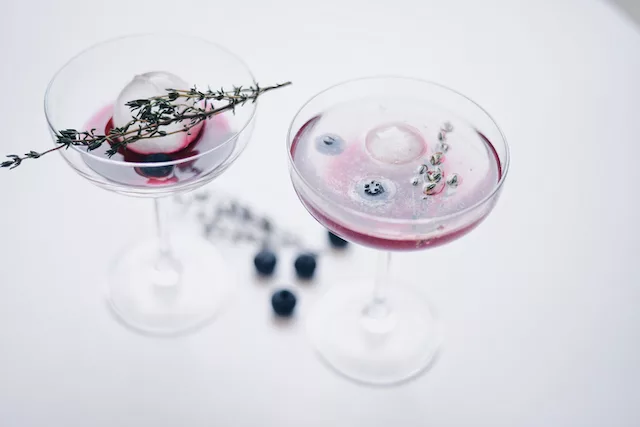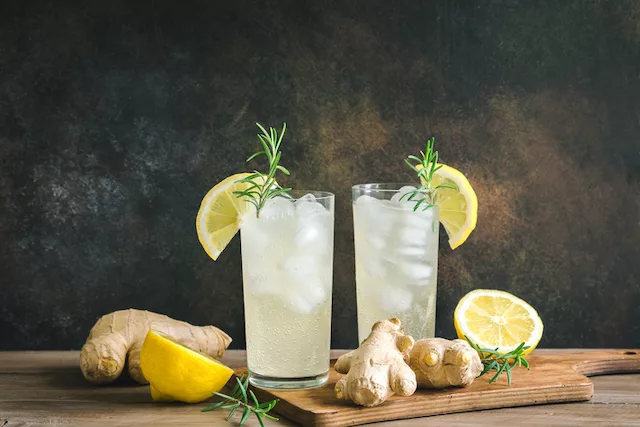These days, sober curiosity isn’t only popular during Dry January. Per Boston Consulting Group, the low-to-no alcohol market is now valued at an estimated $13 billion, with clear indicators of growing expansion in the next few years. The perks of pleasing your palate with tasty mocktails aside, there’s also a world of benefit you can experience by limiting your consumption of alcohol—or by ditching the booze entirely.
Keep reading to discover the many ways in which indulging sober curiosity can boost your overall health and wellness. And later: three RD-developed mocktail recipes worth taste-testing.
5 Benefits of Reducing (or Quitting) Alcohol
Want better sleep, more energy, and happier hormones? Drinking less alcohol and being more mindful of your consumption can move the needle in the right direction in these arenas and beyond. Here’s how.
1. Greater Gut Diversity
According to Chelsea Clarke, RDN, owner of Balance Chaos Nutrition + Fitness, limiting your alcohol intake can spell good news for your gut. “Drinking alcohol can have a [negative] impact on gut health through altering amounts and the diversity of your gut microbiota,” she explains. Gut imbalances (aka dysbiosis) don’t only risk digestive distress but also tax your mind, mood, and hormonal health. As such, reducing or quitting alcohol can help promote gut diversity (though Clarke adds that you’ll still need to be mindful of greater dietary and lifestyle factors, too).
2. Better Sleep and More Energy
While a glass or two of vino might knock you out like a light, research consistently shows that alcohol actually disrupts sleep quality. “Alcohol can impact melatonin levels for up to a week after consumption, which can shift your usual sleep schedule and affect your ability to fall asleep,” Clarke adds. This also means that if you only drink on the weekends, your consumption could still throw your shuteye off track during the work week. Nonetheless, drinking less than you normally do can still get your sleep and energy levels trending in the right direction.
“Reducing the amount of alcohol you drink on each occasion and/or reducing the overall number of occasions that you drink can improve sleep quality and duration and help you feel more rested and energized,” she continues.
3. Weight Management
If you’re trying to lose or manage your weight, consuming alcohol won’t do you any favors. According to Clarke, alcohol packs 7 kcals/gram, which amounts to about 120 calories in a 5 ounce glass of wine or 600+ calories per bottle. Drinking less won’t only help you avoid these non-nutritive calories but also potentially help you avoid alcohol-driven food binges, while also helping you make smarter choices about what you eat.
P.S. Clarke notes that not everyone will lose weight once they lean into sober curiosity. Of course, you’ll still need to stay on track with your diet and exercise regimen and, as desired, adopt healthy weight loss tips that actually work.
4. Fitness Gains
Speaking of exercise, drinking less also stands to benefit your goals for body composition, exercise performance, and then some. “Alcohol negatively impacts exercise recovery and muscle building by increasing pro-inflammatory factors, reducing glycogen synthesis, and decreasing muscle protein synthesis,” says Clarke, who’s also a personal trainer. “Adopting a sober curious lifestyle will likely boost athletic performance by allowing your body to properly recover and build muscle that corresponds with your training efforts.”
5. Improved Health and Well-Being
Limiting or quitting alcohol can stand to benefit your health and wellness goals in countless ways. In addition to the perks outlined above, Clarke says that drinking less or abstaining from alcohol completely may help to:
- Improve hormonal health
- Reduce PMS symptoms
- Manage anxiety and depression
- Reduce the risk of liver disease, kidney disease, and certain cancers
Research also shows that ditching alcohol can reduce your risk of metabolic and cardiovascular disease factors. Plus, doing so can simply give you greater control over your values and goals, thus making you happier, healthier, and more fulfilled.
“Alcohol is a mind-altering substance that can acutely impact your decisions when you are under the influence and affect the functioning of your mind and body in its after-effects in the short- and long-term,” Clarke warns. “With sober curiosity, you get to be the judge of whether (or how much) alcohol is affecting your life, your ability to reach your goals, and your commitment to your values.”
Tips to Lean Into Sober Curiosity
Though it’s far from impossible, whittling down your alcohol intake could be more challenging than it seems. “Even if you don’t consider yourself ‘dependent’ or ‘addicted’ to alcohol, it has broad physiological effects on our bodies and it is so ingrained in our society,” Clarke shares. “These factors increase cravings and cues to drink that can make it surprisingly difficult to abstain.” Still, a bit of determination goes a long way.
Throughout your sober curious journey, Clarke advises:
- Reflecting on your alcohol intake, including what triggers cravings for alcohol and how you feel post-consumption
- Being curious and compassionate rather than judgmental or disappointed
- Consulting a doctor if you’re a heavy drinker, as you may be at the risk of more severe alcohol withdrawal symptoms
She also encourages substituting adult bevs with mocktails if you want to keep your hands (and palate) busy, whether socializing out and about or winding down in the comfort of your own home.
3 Mocktail Recipes, Developed by a Dietitian
Here, check out 3 tasty mocktail recipes crafted by HUM’s education manager, Gaby Vaca-Flores, RDN, developed with hormonal health in mind.
Blueberry Lavender Tonic

Ingredients:
- 1/2 oz fresh lemon juice
- 1 oz tonic water
- 1 oz blueberries
- 1 oz lavender syrup
- Fresh mint leaves for garnish
- Ice cubes
How to prepare:
- In a blender, combine blueberries and lavender syrup with tonic water.
- Add ice cubes and lemon juice in a glass. Pour in blueberry tonic water mixture and garnish with fresh mint leaves.
Why we love it: Blueberries support healthy hormones in a few ways. “For one, they pack antioxidants like anthocyanin, which can help ease oxidative stress that can throw off hormones like cortisol,” Vaca-Flores explains. Plus, its high fiber content supports blood sugar balance and digestion.
Green Tea Mojito
Ingredients:
- 1/2 oz fresh lemon juice
- 2 tsp sugar or your sugar substitute of choice
- 3 spearmint leaves (optional: get a few extra for garnish)
- 3 baby arugula leaves
- 1/2 cup brewed green tea, chilled
- Ice cubes
How to prepare:
- Using a muddler, muddle the lemon juice, arugula, spearmint leaves, and sugar until you notice bruising on the leaves. (If you don’t have a muddler, use a wooden spoon to smash the ingredients together.)
- Add ice cubes in a class and pour in the chilled green tea.
- Stir in lime, arugula, mint, and sugar mixture.
- Garnish with spearmint leaves and enjoy.
Why we love it: “Green tea provides a type of antioxidant called catechins, specifically EGCG, that can help support the hormone insulin. Specifically, EGCG may boost insulin sensitivity, which is key for blood sugar balance,” Vaca-Flores shares.
Lemon Ginger Spritz

Ingredients
- 1/2 oz honey syrup
- 3/4 oz ginger juice (fresh or store bought)
- 1 oz fresh lemon juice
- 3/4 cup sparkling water, chilled
- Fresh lemon peel for garnish
How to prepare:
- In a glass, add honey syrup then stir in ginger and lemon juice.
- Top with chilled sparkling water and garnish with a lemon peel.
Why we love it: Per Vaca-Flores, ginger is an all-star for women’s hormonal health. “It is effective for alleviating period discomfort including cramping and stomach pain,” she shares. “In high doses, it’s also been shown to help ease symptoms of PCOS.”
